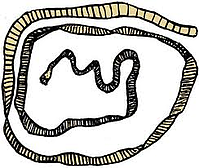 This isn't a pleasant topic, but it is a necessary one. The statistics on how many of us are suffering from parasitic infections is staggering and something needs to be done about it. This week, we will discuss what parasites are, how we get them, what are the most common types, how you can detect them, and why they are dangerous.
This isn't a pleasant topic, but it is a necessary one. The statistics on how many of us are suffering from parasitic infections is staggering and something needs to be done about it. This week, we will discuss what parasites are, how we get them, what are the most common types, how you can detect them, and why they are dangerous.
Parasites: What are they?
Parasites are essentially defined as “any organism that lives on, or in, the body of another organism.” This means that creepy crawlies can be in your gut, your blood, your tissues…or they can be hanging out on your skin, leeching nutrients happily. Though there are many, many types of parasites, there are two main categories used in classifying them: worms and protozoa. Protozoa are single celled and undetectable by the human eye. Worms come in a variety of forms, but are multi-celled and can range greatly in size and damage done. These include the more well-known parasites, such as tapeworm, ringworm and threadworm.
Parasites: How do we get them?
 First of all, parasites are more common than you think they are! Did you know that the United States Centre for Disease Control considers parasites to be their number one health risk! Most people think that parasites are a “third world” problem, but in reality, many studies indicate that up to 95% of North Americans have at least one form of parasite. The World Health Organization estimates that ¼ of the world’s population suffers from chronic intestinal parasites! These are startling statistics and certainly make you think twice about skipping that annual cleanse!
First of all, parasites are more common than you think they are! Did you know that the United States Centre for Disease Control considers parasites to be their number one health risk! Most people think that parasites are a “third world” problem, but in reality, many studies indicate that up to 95% of North Americans have at least one form of parasite. The World Health Organization estimates that ¼ of the world’s population suffers from chronic intestinal parasites! These are startling statistics and certainly make you think twice about skipping that annual cleanse!
 Because it is not possible for anyone to be completely immune to parasite infestation, it is important to know where they come from and how we can protect ourselves. They can enter the body through the mouth, through the nose or absorbed through the skin, such as when walking barefoot. They can also be transmitted directly into your skin or bloodstream via insect carriers. Common places to pick up parasites include the following:
Because it is not possible for anyone to be completely immune to parasite infestation, it is important to know where they come from and how we can protect ourselves. They can enter the body through the mouth, through the nose or absorbed through the skin, such as when walking barefoot. They can also be transmitted directly into your skin or bloodstream via insect carriers. Common places to pick up parasites include the following:
• Contaminated soil
• Travel (especially drug resistant species)
• Contaminated produce
• Raw/rare meat
• Animals (petting zoos, family pets etc)
• Mosquitos
• Fecal matter contact
• Polluted water (ie. Tap water – most municipalities don’t treat for parasites)
• Contact with an infected person
• Restaurants (especially exotic restaurants that serve raw meats and poor food handling practices)
• Sexual intercourse (many parasites are transmitted sexually, including Trichomonas vaginalis, Entamoeba histolyticia, Giardia lamblia, pinworms and pork tapeworms)
• Nutritional Deficiencies (make us more susceptible)
Parasites: What are the most common types?
There are literally thousands of types of parasites, including the deadly malaria, however the six most common, as classified by the World Health Organization, are:
1. Pinworm (mainly affects children)
2. Hookworm (affects 900 million worldwide)
3. Giardia Lamblia (affects one in five North Americans)
4. Roundworms (affects one billion worldwide)
5. Flatworms (affects warmer climates mainly)
6. Tapeworms (come from contact with dogs, beef and pork)
Parasites: How do I know if I have them?
 There are many symptoms associated with parasite infections. If you have two or more of the following, I would recommend that you see a doctor immediately. A stool analysis is commonly used to detect parasites and can be ordered by your medical doctor (often only at your insistence). Bear in mind that some parasites may live in your heart, your lungs or other tissues and so no matter how well the stool sample is analyzed, it can come back as a false negative.
There are many symptoms associated with parasite infections. If you have two or more of the following, I would recommend that you see a doctor immediately. A stool analysis is commonly used to detect parasites and can be ordered by your medical doctor (often only at your insistence). Bear in mind that some parasites may live in your heart, your lungs or other tissues and so no matter how well the stool sample is analyzed, it can come back as a false negative.
• Allergies
• Anemia
• Anorexia
• Loss of appetite
• Arthritis
• Asthma
• Back pain
• Bed wetting**
• Bloating
• Colitis**
• Constipation
• Intestinal cramping**
• Depressed immune function
• Diabetes
• Diarrhea
• Eczema
• Chronic fatigue
• Fever
• Gas
• Numb hands
• Excessive hunger (unable to be satiated)**
• Jaundice
• IBS
• Itchy anus, ears and nose**
• Yeast overgrowth**
• Teeth grinding**
• Sinus problems
• Sleep disturbances
• Brain fog**
• Thyroid imbalance
• Vaginal irritation
• Prostate problems
• Granulomas **
• Sugar cravings
There are many other symptoms that could indicate parasitic infection but the most common and clear indications of an infection are starred above. Due to the obvious generalized nature of these symptoms, it is important to recognize that warning signs of parasites can also be attributed to other common health problems. A good rule of thumb is that if you have been treated for a common ailment and the symptoms persist or recur, it is a good idea to suspect parasites.
 Parasites: Why are they dangerous?
Parasites: Why are they dangerous?
It may not seem like a big deal to you or it may not seem worth it to do an involved parasite cleanse if you just have some bad breath or salt cravings. However, your quality of life can be quickly diminished by an infection that goes unchecked. Parasites can cause excessive weight gain, or the exact opposite! They can cause nutritional deficiencies, hormonal imbalances and have been implicated in heart disease, lowered immune function, HIV/AIDS, and sexual dysfunction. The list goes on and on. Not to mention that they can lie anywhere between 3000 to 200,000 eggs per day! Imagine how one creepy crawly can ravage a healthy body in a matter of days! In short, if you let a parasite grow, it will take over its host until there is no energy or nutrients left to leech. The human body is remarkably adaptable, but we are about living optimally, not just getting by.
Read Part 2: How To Get Rid Of Parasites Naturally.
Written by:
The Optimum Health editorial team
Disclaimer: The above information is provided for informational purposes only and is not intended to replace the advice of your physician.


